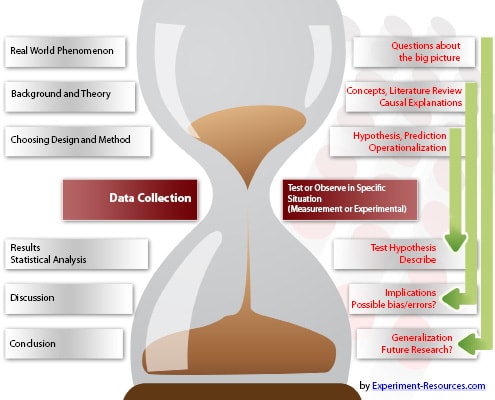- Home >
- Research
Research Basics
The research process deals with the ways and strategies used by researchers to understand the world around us. This is a guide to basic elements of scientific research.
This article is a part of the guide:
Browse Full Outline

Research Basics
 | Research Methods |
 | Experimental Research |
 | Research Designs |
 | Statistics in Research |
What is Research?
Basics of the Scientific Method
What is the Scientific Method?
Definition of the Scientific Method
Steps
Steps of the Scientific Method - The scientific method has a similar structure to an hourglass - starting from general questions, narrowing down to focus on one specific aspect, then designing research where we can observe and analyze this aspect.
At last, the hourglass widens and the researcher concludes and generalizes the findings to the real world.

Aims of Research
The general aims of research are:
Purpose of Research - Why do we conduct research? Why is it necessary?
Elements of Research
Common scientific research elements are:
Characterization - How to understand a phenomenon
- Decide what to observe about a phenomenon
- How to define the research problem
- How to measure the phenomenon
Hypothesis and Theory
- The research questions before performing research
- Almost always based on previous research
- What answers do we expect?
- Reasoning and logic on why we expect these results
Observation or Experimentation
- Testing characterizations, hypothesis, theory and predictions
- Understanding a phenomenon better
- Drawing Conclusions
Check out our quiz-page with tests about:
Oskar Blakstad (May 6, 2008). Research Basics. Retrieved Feb 24, 2026 from Explorable.com: https://explorable.com/research-basics
You Are Allowed To Copy The Text
The text in this article is licensed under the Creative Commons-License Attribution 4.0 International (CC BY 4.0).
This means you're free to copy, share and adapt any parts (or all) of the text in the article, as long as you give appropriate credit and provide a link/reference to this page.
That is it. You don't need our permission to copy the article; just include a link/reference back to this page. You can use it freely (with some kind of link), and we're also okay with people reprinting in publications like books, blogs, newsletters, course-material, papers, wikipedia and presentations (with clear attribution).
This article is a part of the guide:
Browse Full Outline
Footer bottom




